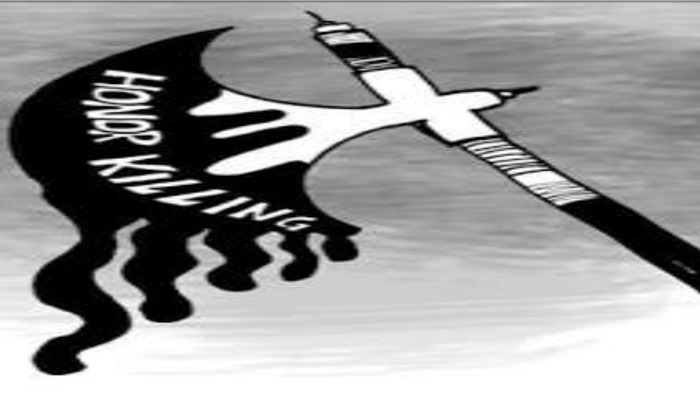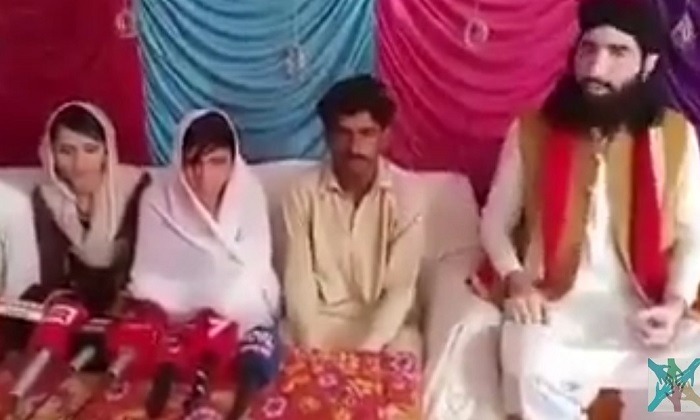[wp_ad_camp_1]

Honour Killings Cause Dishonour
By Zaib Azkaar Hussain
Karachi
An English proverb says “Give a dog a bad name and hang him” that can be applied on the matter of killing of poor women by their husbands, brothers, fathers, in-laws and other relatives at in Pakistan. The year 2019 has become a very crucial and rather dreadful for women as a number of women have been killed from the beginning of the year to the month of April.
On April 2 two women were killed in the name honour in two different incidents and in two different cities. A young man Wajid killed his elder sister Kanwal Shehzadi in a suburban area of Gujranwala (Wahndo) while noticing that she had talked to someone on her cellphone. The suspected killer later fled away. In In another incident, a man supported and assisted by his other family member killed his wife. According to the father of the unfortunate woman (Liaquat Ali) her daughter was tied to her bedstead and later her husband and other family members spread corrosion oil on her body that burnt her alive. The police arrested the husband of the deceased woman to interrogate the matter.
On the first week of April (on April 5) a man axed his wife to death for honour and escaped the scene.
The accused hailing from suburbs of Ghotki was suspicious of his wife’s activities and blamed her without proof. An exchange of hot words took place between the couple over the issue after which the annoyed husband axed his wife to death and escaped after committing the murder
On April 5, the Khairpiur police had recovered bodies of two murdered couples from different area and had suspected the four persons were killed in the name of ‘honour’ because of the fact that murdered man Ali Nawaz and deceased woman SAmina Marfani had settled in Khairpur after eloping from Shikarpur. They had entered a marriage against the wishes of their families. Tragically, a post-mortem report stated that the couple had been strangled to death. The female victim’s family, in this case, refused to register a case and ultimately a complaint was lodged on behalf of the state that became the plaintiff in the matter that got registered a case against six identified suspects and two unidentified suspected killers. In another separate case a girl and a married man were found dead at a house. A post-mortem report revealed that the two persons had been tortured and strangled to death. In this case pertaining to ‘honour’ killing’ charges, four people were arrested.
On April 6, a man axed his wife to death for honour and escaped the scene.
The accused hailing from suburbs of Ghotki was suspicious of his wife’s activities and blamed her without proof. An exchange of hot words took place between the couple over the issue after which the annoyed husband axed his wife to death and escaped after committing the murder.
On April 13, a man Falak Sher hailing from tehsil Daska of Sialkot levelled baseless allegations on the character of his mother Razia Sultana and injured his mother severely. It is said that the cruel man attached his mother, along with his accomplices and later escaped.
Police said that accused Falak Sher himself himself encouraged his accomplices, Mushtaq, Aaqash, Sharif and Akram who had barged into his house and opened fire at his mother.
On April 21, in Bannu a man killed two people, including his sister-in-law, for ‘honour’.
The incident took place in the city’s suburbs where a man gunned down the wife of his elder brother and her alleged friend for having an affair.
The accused fled the scene after committing the double murder.
On March 25, a 30-year-old woman, Uzma was allegedly killed over ‘honour’ after marrying on her own free will in Lahore.
It was said that Azhar and Qasim got maddened by her decision and attacked her with an axe, that injured her severely and she succumbed to her injuries. Ironically another sister of the victim (Uzma), Tehmeena also sustained injuries while trying to shield her.
On March 31, a resident of Faisalabad’s Kanjwani area, Riaz shot dead his sister Surraiya Bibi to save his ‘honour’ and ran away. The unfortunate woman (Surraiya Bibi) was said to have got separated from her husband sometime back due to some differences. After the divorce, she used to live with her parents in the area of Shadi Peeran but her real brother raised the question of alleged illicit relationship with some ‘unknown’ man residing near his (brother’s) home. He finally (after a heated argument) took his pistol and opened fire at her only over the suspicion of illicit relationship he had assumed.
In the night of December 22, 2018, a youth Fazlur Rehman, son of Rehmat Nabi allegedly killed two young girls Gulkabina Bibi and Yasmeen Bibi and two boys namely Bostan and Sobat Khan in the name of ‘honour’ in an Upper Kohistan village called Sair Lotar. The four persons aged 20-22 year old who were killed brutally (by their blood relative) were cousins.
The Upper Kohistan Police had arrested the suspected killer of four persons in the name of honour within 24 hours and recovered the weapon used in the crime.
In this case, the father (Abdul Rauf) of deceased Gulkabina Bibi had registered a murder case against suspect Fazalur Rehman under section 302 Pakistan Penal Code (PPC).
A study conducted by Pak Chronicle shows that the no serious legal steps have still been taken by the government to address the issue that was giving very bad name to reputation of country in the eye of international community.
The issue of ‘honour killings’ was strongly condemned by the leaders across the world, when a 26-year-old model, actress, and social media celebrity Qandeel Baloch was murdered on July 15, 2016 by her own brother due to ‘honour killing’ in Multan.
Her murder was widely condemned by media celebrities and people around the globe.Imran Khan, now prime minister of Pakistan at that time had strongly condemned the murder as being the head of his political party (Pakistan Tehreek-e-e Insaf). The then government had made tall claims to issue the issue in question but of no avail. After the passage of four days, on July 20, 2016 a British national Pakistani woman, Saima Shahid (aged 28) was raped and strangled to death in the name of ‘honour killing’ in Punjab.
A tragic aspect of the incident was that Samia Shahid was summoned back under a false pretext that her father was seriously ill. As she received a telephone call, claiming that father was critically ill in Pakistan, she flew for Islamabad in order to visit her father, Later she was found dead. It was claimed that her ex-husband Shakeel had assaulted and killed her. This incident also damaged the reputation of the country which is termed as the fifth one where 1000 women (out of 5000 in the world) are annually killed in the name of honour,
The Human Rights Commission of Pakistan (HRCP) in its annual report (on the state of human rights in 2018) while monitoring data showed 845 incidences of sexual violence against women, and 316 crimes in the name of ‘honour’ perpetrated against both men and women. Child sex abuse incidents remained on the rise. One report showed an increase of 32 percent in the first six months of 2018 compared to the same period the previous year, a 47 percent increase in cases involving boys, and a 75 percent rise in sexual violence against children in the age group of 0-5 years. The report highlighted that despite legislation, violence against the transgender community continued during the year and cybercrime and online harassment across Pakistan saw an exponential rise.
The Amnesty International in its report (covering state of affairs in 2017 and 2018) said that “Key legislation to protect women’s rights failed to be passed and existing legislation was not enforced. The draft Sindh Criminal Law (Protection of Minorities) that criminalized forced conversions of women from religious minority groups remained unratified. A bill that would have equalized the age of consent to marriage for men and women by raising the minimum age of marriage for girls from 16 to 18 was blocked by the upper house of Parliament.”
In the wake of violence against women, the report notes that violence continued against women and girls, including killings by relatives committed in the name of so-called “honour”. In Khyber Pakhtunkhwa northwest province, 94 women were murdered by close family members. In several cases, there was a failure to conduct investigations and hold the perpetrators accountable.
Parallel and informal justice systems continued to undermine the rule of law and to issue unjust “verdicts” that punished women and girls. The report mentioned that in July, a village council in Multan district ordered and carried out the rape of a teenage girl in “revenge” for a crime allegedly committed by her brother. In August, the bodies of a teenage couple in Karachi were exhumed to reveal evidence of electric shocks. The couple had been sentenced to death by a jirga (tribal council). In September, a man in Peshawar city killed his two daughters because he suspected they had boyfriends, the report added.
The report highlighted that the 2016 law, which brought the penalties for so-called “honour” crimes in line with murder, proved ineffective. The law, which provides for the death penalty, allows the judge to decide whether the crime was “honour-based”. In some cases in 2017, the accused successfully claimed another motive and was pardoned by the victim’s family under qisas and diyat laws, which allow for “blood money” and forgiveness instead of punishment.
Some advocates of the country suggest that law dealing with the murder charges must be be reviewed and the cases pertaining to the charges of killings of women under the pretext of honour, should be sent to anti-terrorism courts (ATCs).
It may be mentioned that Section 7 of the Anti-Terrorism Act 1997 deals with the punishments for those involved in terrorist activities.
An advocate of Supreme Court, Shakeel Ahmed Satti underlines that such law makes it clear that whoever commits an act of terrorism under Section 6 that causes death of any person should be punishable, on conviction, with death or with imprisonment for life, and with fine. The law even asks to punish the accused who did not anything likely to cause death or endangers life, but death or hurt is not caused, he adds. Sub Section of this law (c) says “Grievous bodily harm or injury is caused to any person, shall be punishable, on conviction, with imprisonment of either description for a term which shall not be less than ten years but may extend to imprisonment for life and shall also be liable to a fine; or (d) Grievous damage to property is caused, shall be punishable on conviction, with imprisonment, of either description for a term not less than ten years but may extend to imprisonment for life, and shall also be liable to a fine; or (e) The offence of kidnapping for ransom or hostage-taking has been committed, shall be punishable, on conviction, with death or imprisonment for life.”
In several cases, the women were kidnapped or tempted with their respectable marriages but instead they were brutally killed into pieces or burnt alive by their close relatives.
Another noted writer and scholar, Zulfeqar Gadhi said that the killings in the name of honour have a history and the feudal lords and other influential classes of the society used to kill women for securing their properties. The birth of girls was considered to be a ‘burden’ and ‘hurdle’ in dealing with the property issues and that started a way to eliminate the women who tried to marry someone else from the community and tribe. In English era, the influential families were treated with a lenient view in law and mostly were freed the killers due to the aspect of ‘honour’. He said that in present times, it needed to review the laws to deal such killer with iron hand in legal terms.
Another prominent writer and novelist, Naseem Anjum who wrote several Urdu short stories on the issue of ‘honour killings’ says due to the lack of education and male-dominated structure of society was also leading the crisis of hobour killings. She stressed upon reasonable laws and spreading education and awareness on the issue in question.
Ends



